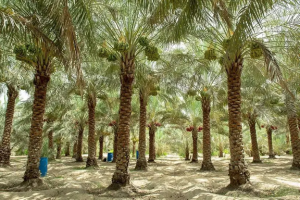
The Date Palm in the UAE: A Symbol of Heritage and Sustainability
The date palm (Phoenix dactylifera) holds a special place in the UAE, representing both cultural heritage and sustainability. Deeply rooted in the region's history, it has provided sustenance, shelter, and economic value for generations. Today, the significance of the date palm continues, but with a modern twist—research is actively improving cultivation practices, enhancing sustainability, and promoting food security.As a cornerstone of Emirati culture, the date palm has long been celebrated for its resilience in the desert. It is honored in festivals and folk stories, serving as a symbol of survival and prosperity. Economically, the date palm plays an essential role. The UAE is one of the world’s largest producers of dates, cultivating over 200 varieties. This production not only feeds the local population but also fuels exports and supports industries such as tourism and food processing.
However, with the UAE facing water scarcity challenges, research on water-efficient cultivation methods for date palms has become critical. Techniques like drip irrigation and the use of treated wastewater have helped reduce water usage while maintaining high productivity on farms. Another challenge is soil salinity, particularly in coastal and arid regions. In response, scientists are working to develop salt-tolerant date palm varieties, which are better suited to thrive in these harsh conditions, ensuring sustainable agriculture for the future.Biotechnology and genetic research have also been key in the UAE’s efforts to improve the quality and resilience of date palms. By focusing on genetic traits, researchers aim to enhance resistance to pests and diseases, boost yields, and improve the nutritional value of dates. These innovations are vital as dates are an integral part of the UAE’s food security strategy. Nutrient-dense and rich in essential vitamins and minerals, dates can help reduce the country’s reliance on food imports and promote healthier eating habits among the population.
Environmental sustainability is another area where the date palm shines. The trees help combat desertification by stabilizing sand dunes and creating microclimates. Additionally, their byproducts—leaves and trunks—are utilized in various crafts and construction projects, reducing waste and further contributing to sustainability efforts. The growing demand for organic date farming has led to research on natural pest control methods and organic soil management, ensuring that the UAE can meet consumer demand without compromising the quality of its date production.In recent years, the focus has also shifted to creating value-added date products such as date syrup, date sugar, and date-based snacks. These innovations increase the commercial appeal of dates and open up new markets for UAE producers. Research into these products has helped boost the profitability of the date palm industry and aligned it with modern consumer trends.Collaboration with international research centers has been another important aspect of the UAE’s date palm research. By working with institutions in countries like Egypt and Morocco, the UAE has gained valuable insights into pest management, drought resistance, and other challenges. These partnerships enhance the country’s ability to innovate and lead in sustainable date palm cultivation.
In conclusion, the date palm remains a vital symbol of the UAE’s cultural and agricultural landscape. Through extensive research on water efficiency, soil salinity, genetic improvements, and sustainable farming practices, the UAE is ensuring that this ancient tree continues to thrive. The focus on food security, environmental sustainability, and economic growth ensures that the date palm will remain a key part of the UAE’s future, just as it has been throughout its past.
